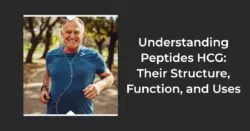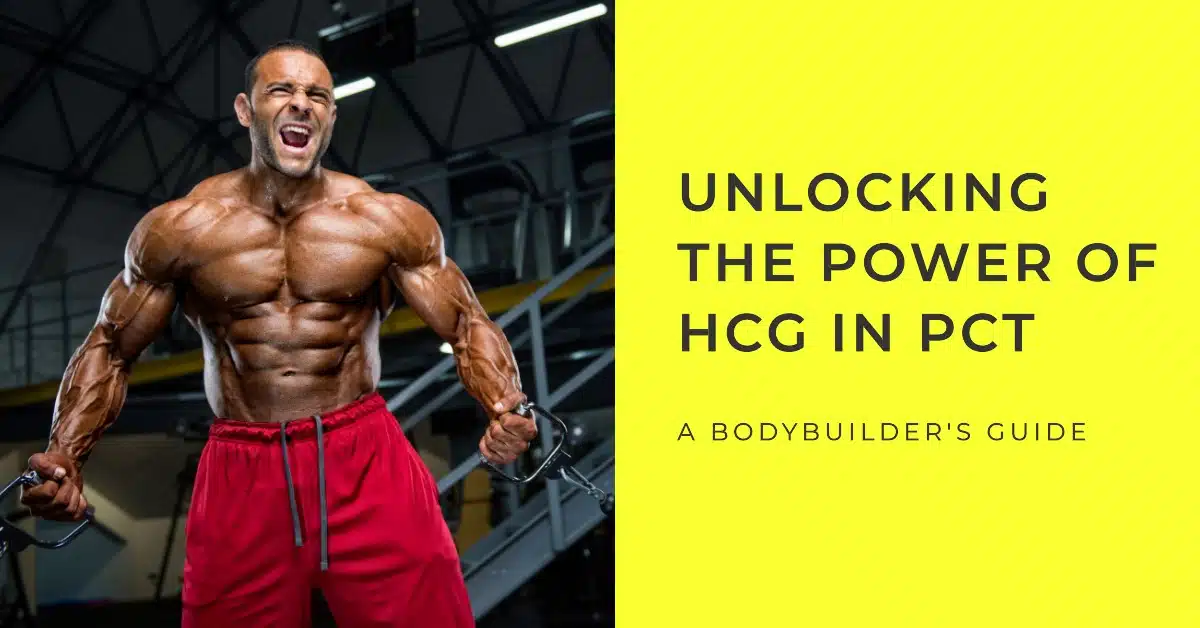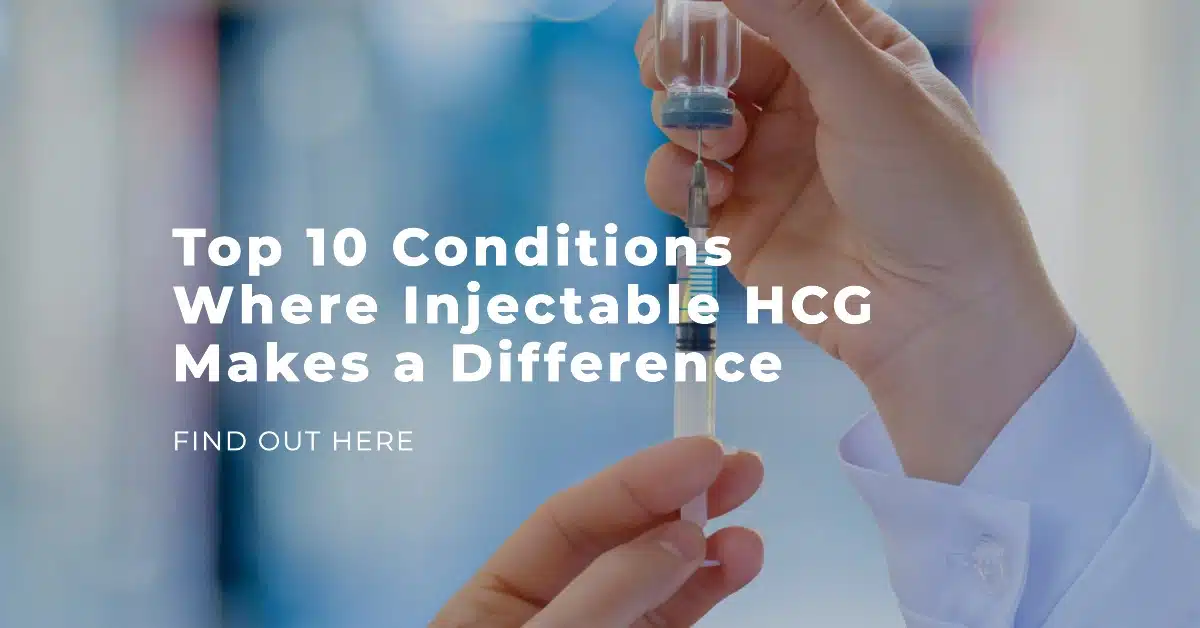Are you ready to unlock your full potential as a man? Ever imagined how boosting your testosterone levels could supercharge your life in ways you never thought possible – stronger muscles, sharper mind, better love life?
The potentially transformative component for optimal male health could be HCG – Human Chorionic Gonadotropin! Let’s delve into this understated hormone and see how its benefits can be harnessed.
The Role of HCG in Testosterone Production in Men
The marvels of the human body are incomparable. The way it functions, from the smallest cells to complex biological systems, is a testament to its incredible nature. Let’s focus on an aspect of men’s health – testosterone production.
Human Chorionic Gonadotropin (HCG) has superstar status here! Produced primarily in the pituitary gland, this wondrous hormone plays a key part in stimulating your testes into action. It leap-starts the testosterone production machine!
Now, you might be wondering, “Why is the testosterone so important?” Remember those changes during puberty? The deepening voice, growth spurts and even facial hair – yes, that was all driven by testosterone.
As you age or with certain health conditions, however, testosterone levels might decline leading to symptoms associated with ‘low T’ or testosterone deficiency, such as fatigue and mood disorders. This is where Testosterone Replacement Therapy (TRT) becomes necessary for some men.
Yet there’s good news! HCG rides to rescue even during TRT. Here’s how: when administering TRT it artificially provides your body with testosterone which can trick your pituitary gland into thinking it doesn’t need to produce LH anymore — a hormone that promotes testosterone production.
Used strategically during the therapy HCG works as an LH mimic continuing stimulation of Leydig cells in testicles for natural testosterone production hence preventing primary or secondary hypogonadism and ensuring balanced hormone function throughout treatment.
So picture this: at one end you have Testosterone Replacement Therapy supplying extra doses of our superhero hormone – and at other end stands HCG diligently amplifying your body’s own natural firepower alongside!
Let this scenario remind us once again of the intricate interconnections within our bodies – each system supporting others in harmony ensuring optimal health and performance.

HCG: The Guardian Against Testicular Shrinkage
Peering into the dynamic world of our bodies, the role of hormones can not be understated. They control numerous vital processes, and a slight imbalance or disruption can have noticeable effects. Today, let’s uncover one such scenario – the issue with testicular shrinkage when on Testosterone Replacement Therapy (TRT).
Picture this: you’re undergoing TRT for a condition known as ‘Low T’ which is related to testosterone deficiency. It’s meant to help your body recoup the lost testosterone levels. Sounds perfect right? But oh dear! There’s a snag — testicular shrinkage or atrophy may occur as an unexpected side effect.
Why does this happen- you ask? When external testosterone is introduced through TRT, it creates an “imitation” of high testosterone level in your body leading it to believe that there’s no need for continued testosterone production. Consequently, Leydig cells in testicles decrease their activity resulting in reduced testicular size – like a factory going idle due to less demand!
And here’s where Human Chorionic Gonadotropin steps in as savior! Acting similarly to luteinizing hormone (LH), HCG doesn’t take its foot off the pedal but keeps goading your Leydig cells into action assuring they continue with their normal duties despite TRT-induced deceptions.
Essentially, introducing some HCG while you’re on TRT helps preserve and maintain your testicular volume. What if shrinkage has already occurred though? Don’t fret! HCG performs dual duties – it’s also capable of reversing some degrees of existing atrophy by rejuvenating those relaxed Leydig cells back into operation mode!
Thus Human Chorionic Gonadotropin lays claim not only as your ‘Testosterone Booster’ but also as ‘Guardian against Testicular Shrinkage’, optimizing therapy benefits while minimizing unwanted physical changes showing once again how versatile and crucial these hormone controllers really are!
The Connection Between HCG and Fertility
An easy-to-grasp fact? Sperms carry half the genetic information needed for creating a new life. How do these tiny swimmers manage to get all this responsibility? It’s due to an elegant interplay of various hormones, and one critical player here is our multi-talented Human Chorionic Gonadotropin (HCG).
Here’s a fascinating look at the ‘behind-the-scenes’ action:
- Role of hormones: The pituitary gland releases luteinizing hormone (LH) and follicle-stimulating hormone (FSH), encouraging testosterone and sperm production respectively.
- TRT and fertility: Whilst Testosterone Replacement Therapy helps regain lost vitality from Low T, it might incidentally reduce your ability to father a child by lowering sperm count.
- Enter HCG: Sometimes nicknamed the ‘Gonad Whisperer’, HCG swings into action right then! It mimics LH’s actions persuading Leydig cells in testicles to continue manufacturing testosterone thus maintaining hormonal harmony.
- Dual benefits of HCG: But that’s not all folks! More estrogen can be converted from this naturally produced testosterone which stimulates FSH releasing cells indirectly resulting in enhanced sperm creation — boosting your chances for paternity.
This study concluded:
We found subjective improvement in erectile dysfunction, 86% (19/22), and libido, 80% (20/25)….
In effect, adding HCG into a TRT regimen serves as an add-on fertility enhancer owing to its unique multitasking abilities; adjusting your internal body mechanics just right, promoting healthy testosterone levels while also improving sperm count! Fascinating isn’t it – how nature wires reinforcements when you least expect them… all part of the profound scientific wonder our bodies encase!
The Impact of HCG on Weight Loss
The struggle with weight loss is a common theme – being able to achieve the desired results while also retaining energy levels. Here’s where an intriguing molecular champion comes into play: Human Chorionic Gonadotropin (HCG). It has some impressive abilities such as suppressing appetite and prioritising fat over muscle for energy, which can lead to noticeable weight loss without adversely affecting body composition.
Let’s simplify this complex process:
- HCG Introduction: Starting a protocol that includes HCG, possibly in bioidentical form due to its close resemblance to the hormones naturally found in the body, you set in motion a chain of events towards weight management.
- Appetite Control: Once on an HCG plan, you might find your previously relentless hunger pangs easing off. This can be attributed to how HCG interacts with your brain’s hypothalamus regulating ghrelin—the “hunger hormone”. This modulation aids in dampening feelings of constant hunger and cravings.
- Fat Burning Priority: Despite a reduced caloric intake due to suppressed appetite, instead of muscle depletion commonly feared during lower intake circumstances, HCG assists in navigating your body towards burning stored fats for energy production! Simultaneously, it helps retain lean muscle mass.
- Weight Management: Over time with discipline and adherence to the regimen which usually involves correlating Very Low Calorie Diet (VLCD), there is potential for considerable but sustainable weight loss whilst maintaining body structural balance and energy levels.
- Associated Benefits: Other potential advantages could include enhanced gym performance enabled by maintained stamina from preserved muscles coupled with better food choices and moderate exercise included within these disciplined wellness plans.
HCG, Hypothalamus, Ghrelin and Leptin: The possible connection.
In the quest to understand weight loss, the picture isn’t complete without considering key players: Hypothalamus, Ghrelin, and Leptin. There’s a hypothesis suggesting that HCG has an influential role stimulating hypothalamic reactions which could play crucial roles in regulating our food intake. Let’s dive everything down:
- The Hypothalamus: Physiologically serving as the command center for appetite control in your brain, it gets vital signals triggering feelings of hunger or satisfaction.
- Enter Ghrelin and Leptin: These two are like hormonal yin and yang; while Ghrelin goes up making you feel hungry, Leptin takes the opposite route – letting you know when you’re satiated. They communicate constantly with your hypothalamus influencing your food intake behaviors.
- HCG and The Hypothalamus Connection: Research suggests that HCG administration might influence some hypothalamic actions encouraging more favorable responses towards these hormonal messages specifically by modulating ghrelin levels leading to reduced cravings and promoting fuller feelings – quite a charm!
- Potential Impact on Leptin: Although it’s not entirely clear how HCG directly affects leptin function there are speculations based on observations that effective regulation of ghrelin via HCG could also support healthier leptin response thereby improving overall sense of satiety during very low calorie diets ensuring better caloric control.
From this viewpoint, it looks like a well-orchestrated pattern—the intervention of hCG potentially maneuvering factors responsible for managing meals—resulting in regulated appetite which then enables smoother navigation through lower caloric intakes commonly associated with weight loss regimens. It represents yet another fascinating example of multifaceted pathways within the human body!
HCG: A Potential Enhancer for Libido, Sexual Performance, and More
Introducing an interesting facet to the many intriguing roles of Human Chorionic Gonadotropin (HCG) — its potential effect on libido, sexual performance and penis growth. While it’s widely known for its role in testosterone production, some anecdotal accounts suggest that men may experience positive effects extending beyond just hormonal balance. Let’s sift through these experiences:
- Boosting Libido: It makes sense that with HCG helping in natural testosterone production during Testosterone Replacement Therapy (TRT), one might see an improvement in sex drive or libido. After all, testosterone is the central driving hormone behind sexuality in men.
- Enhancing Sexual Performance: Some men have reported better sexual performance when undergoing an HCG regimen alongside TRT. This includes increased stamina and potentially even more intense climaxes.
- Increased Semen Volume: With HCG playing part in a complex chain linked to sperm production as we discussed earlier—there could be a potential side effect: more abundant ejaculation semen volume which although not necessarily improving fertility confers added feeling of masculinity to some.
- An Interesting Prospect- Penile Growth? The topic becomes curiouser when delving into this matter – there are examples of hCG being used to treat ‘micropenis’ condition within prepubescent boys by spurring penile growth primarily thanks again to its action mimicking luteinizing hormone (LH) stimulating testosterone secretion leading to genital development. In studies conducted on patients with IHH and a condition called micropenis, it was found that HCG treatment increased the length of the penis.
Would adult males also respond the same way though? Scientifically, it remains largely unknown so far and hence serves as a point of interest inviting further exploration into the wide spectrum of capabilities this stupendously versatile triumvirate— LH surrogate HCG along with Follicle-stimulating hormone(FSH) controlling myriad pivotal aspects from tissue framework formation till reproductive functioning.
In summary; It might be fair hence while shedding light upon such effects of Human Chorionic Gonadotropin on male sexuality it held: The hormone’s influence spreads far beyond primary functions leaving us intrigued about the hidden dimensions yet to be discovered within our biological systems!
HCG and the Role in Muscle Preservation
With lifestyle changes including diet modification, maintaining muscle mass becomes a crucial concern especially while on a low-calorie dietary regimen. And here, our known multitasker – Human Chorionic Gonadotropin (HCG), pops up again for its hypothesized role in shielding our muscles!
- Understanding Muscle Mass: Let’s admit it — we all love lean muscle! It doesn’t just represent strength visually, but also indicates good functional health. Muscles are metabolically active, which means they burn calories even when you’re not working out — pretty smart!
- Low-Calorie Diets and Muscles: Generally while on low-calorie diets intended for weight loss often with reduced protein intake initially your body might turn towards muscles over fat reserves as an easy energy source leading to potential muscle loss before substantial fat reduction.
- Role of HCG: However,hypothesize that if you’re simultaneously taking HCG might trigger your body to reach out to stored fats over your cherished muscles for energy needs. Why would that happen? Well, recall how HCG behaves like luteinizing hormone (LH), prompting testosterone production? These heightened testosterone levels then promote anabolic metabolism conducive to better muscle preservation!
- Potential Benefits: If this theory holds true—along with weight loss strategy success from fat burning over muscle depletion enabled by HCG can additionally assist you in maintaining a healthier protein framework leading to enhanced body composition where ‘loss’ is recast in more positive light as losing unwanted fat but gaining or keeping healthy muscular structure securely.
It appears once more that the molecular mastery of Human Chorionic Gonadotropin could encompass care not only of hormonal management or fertility but potentially safeguarding structural integrity thereby acting as quite an impressive sentinel within our intricate physiological network!
The Correlation Between HCG, Energy Levels and B12 Supplementation
Weight loss regimes can be tough. Especially when accompanied by decreasing energy levels—a common gripe when we’re on a Very Low-Calorie Diet (VLCD). But wait, what if we told you that Human Chorionic Gonadotropin (HCG) could help there too?
- HCG for Energy: By channeling your body to utilize fat storage for energy during calorie-deficit periods, HCG lends a hand in maintaining acceptable energy yield levels despite reduced food intake. This way it aids in smoothing the weight loss journey without leaving you feeling constantly run-down.
- Vitamins and Energy: However, our diet isn’t only about calories but also crucial vitamins one of which is Vitamin B12 known as an ‘Energy Booster’. During low nutrition coverage of VLCDs these could get overlooked leading to tiredness or weakness due to its deficiency.
- B12 Supplementation: Keeping above in view many weight watchers during such plans decide proactively to supplement with Vitamin B12 replenishing these possibly dwindling stocks ensuring healthier nervous system functioning along with steady energy supply making it easier for individuals to adhere to dietary protocol achieving desired weight management goals.
- The Synergy: Imagine this—on one end you have HCG orienting your metabolism towards opting stored fats over easy-access carbohydrates as primary fuel generator; parallelly fortified with extra line of defense by incorporating B12 supplementation energizing your system efficiently throughout the day- pretty strategic right?
In summary: When thoughtfully correlated the combination of Human Chorionic Gonadotropin facilitating healthy fat browning processes complemented further through supplemental aids like Vitamin B12 fosters not just more sustainable calorific control but also actively modulates energetic build thereby redefining overall approach towards comprehensive wellness planning.
HCG: A Vital Aid in Recovery After Therapy or Post-Cycle Treatment
Halting medical treatment is often a delicate process. This holds particularly true for Testosterone Replacement Therapy (TRT) and steroid cycles due to hormonal shifts associated with them. Here, Human Chorionic Gonadotropin (HCG) steps into the picture as an effective aid during these transition periods.
- Stopping TRT: When therapy ends, your natural testosterone production doesn’t simply kick back into gear overnight; it’s a gradual process that needs encouragement. HCG can fill that role thanks to its luteinizing hormone resemblance stimulating Leydig cells in testicles for maintaining testosterone flow even post cessation of external TRT supplementation.
- Post Cycle Treatment: In bodybuilding circles, users often undergo a ‘cycle’ of anabolic steroid use followed by an off-cycle period referred to as Post Cycle Treatment (PCT). Here again it’s ”all hands on deck” situation where you need your home-made testosterone production machinery operational quickly.
- How HCG Helps: As with TRT, having been on an HCG regimen prior could potentially encourage your testes to resume their normal functionality faster helping prevent unwelcomed side-effects like testicular atrophy or infertility caused by sudden drop in testosterone levels—it helps guarantee that factory switch remains ‘ON’.
- Change Made Easy: It empowers the management of physiological changes accompanied by either terminating therapy or after-cycles ensuring relatively smoother transitions towards healthier improved Testosterone functions.
Wrapped up: Ceasing medical treatments especially ones involving hormones isn’t always so black and white but transition phases of gray which has our superhero here—HCG acting like sort of damage-control chief marking areas susceptible to fallbacks post-treatment stage and structuring its protective strategies accordingly to maximize beneficial outcomes from such intermissions!
The Influence of HCG on Mood and Overall Well-being
Happiness is a byproduct of good health, right? What if we told you Human Chorionic Gonadotropin (HCG) isn’t just about physical well-being but could potentially span into emotional territory as well.
- Testosterone and Mood: Believe it or not, testosterone has a say in your mood. It’s not all about muscle mass and libido. Studies have proposed interesting links between testosterone levels and feelings of wellness, confidence, even decreasing likelihood of depression!
- Making the Connection: As discussed before, HCG goes undercover as the luteinizing hormone potentiating testicular Leydig cells into secreting more testosterone—this elevated platoon can then influence various bodily functions including potential positive effects on mood patterns.
- Perceived Impacts: Some anecdotal reports from men using hcg along with TRT suggest favorable changes incorporating improved energy vigor correlated with enhanced mood states further improving their quality-of-life scores during therapy sessions.
In summary : With its capacity to lift testosterone levels within the body, HCG boasts potential beyond physiological corrections – it might subtly sweep through the corridors of psychological health too stimulating positive emotional outcome dimensions reinvigorating a sense of comprehensive wellness.
Weighing Up the Side Effects and Risks of HCG Usage
Human Chorionic Gonadotropin (HCG), despite being a natural hormone within the body, can still present varying side effects when used for therapeutic purposes.
- Very Rare: On the rarer end, blood clot formation has been associated with HCG treatment. Though infrequent, this serious side effect necessitates immediate medical attention if suspected.
- Less Common: Less common yet significant risks include mood fluctuations like irritability or restlessness. These potential emotional disturbances can vary in their intensity among different individuals.
- Common: More typically reported side effects comprise mild headaches, slight water retention causing swelling or bloating and tenderness at injection site.
The hormones your body naturally produces are perfectly balanced to meet its needs. When introducing outside hormones such as HCG, even those identical to what we produce ourselves — like bioidentical hcg— it’s crucial to remember that potential risks and considerations come into play.
Conclusion
The versatility of Human Chorionic Gonadotropin (HCG) goes beyond a singular role, but an impressive repertoire. Ranging from enhancing male fertility to potential weight loss facilitation and even contributing to mood modulation— HCG portrays an intriguing hormone that offers much promise in various aspects of physiological functions and overall well-being in men.
Used in combination with Testosterone Replacement Therapy or as Post Cycle Treatment following steroid use, it assists in easing transition phases—keeping natural testosterone production mechanisms active, securing the body’s physiological balance during any abrupt hormonal changes.
However, all medical treatments carry potential risks alongside their benefits—and HCG is no exception. It’s crucially important that such therapies should be pursued based on comprehensive prior research and under qualified supervision for informed health decisions adapted best towards individual needs.
Enhancing understanding about these multifaceted roles of hcg ultimately serves to piece the complex puzzle together giving us more effective tools for managing hormonal health matters providing exciting avenues poised for future exploration within this dynamic field!
Bonus:
My experience and knowledge in the fitness and wellness industry have led me to specialize in providing practical and insightful content to help individuals achieve their health goals. Beyond my professional life, I have a deep-rooted passion for nature and fitness, which I express through my love for pickleball and hiking.











